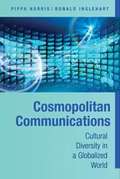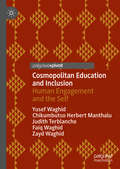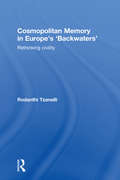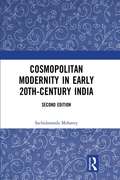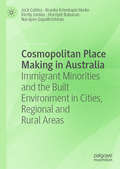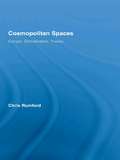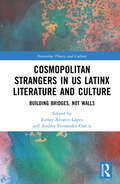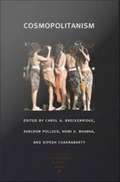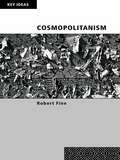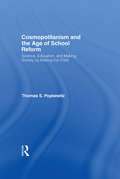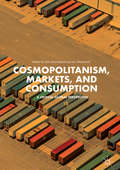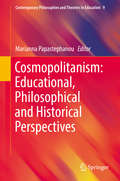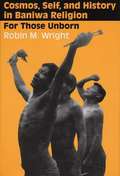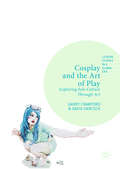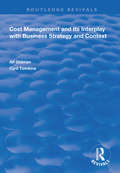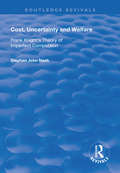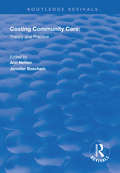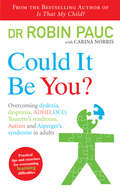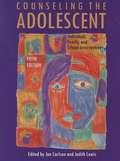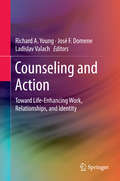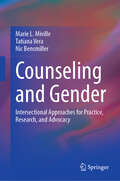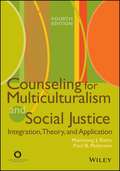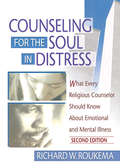- Table View
- List View
Cosmopolitan Communications: Cultural Diversity in a Globalized World
by Pippa Norris Ronald InglehartSocieties around the world have experienced a flood of information from diverse channels originating beyond local communities and even national borders, transmitted through the rapid expansion of cosmopolitan communications. For more than half a century, conventional interpretations, Norris and Inglehart argue, have commonly exaggerated the potential threats arising from this process. A series of fire-walls protect national cultures. This book develops a new theoretical framework for understanding cosmopolitan communications and uses it to identify the conditions under which global communications are most likely to endanger cultural diversity. The authors analyze empirical evidence from both the societal level and the individual level, examining the outlook and beliefs of people in a wide range of societies. The study draws on evidence from the World Values Survey, covering 90 societies in all major regions worldwide from 1981 to 2007. The conclusion considers the implications of their findings for cultural policies.
Cosmopolitan Education and Inclusion: Human Engagement and the Self
by Yusef Waghid Faiq Waghid Zayd Waghid Chikumbutso Herbert Manthalu Judith TerblancheThis book expands understanding of cosmopolitan education that has the potentialto cultivate deliberative pedagogical encounters in universities. The authorsargue that cosmopolitan education in itself is an act of engaging with strangeness,otherness, difference and inclusion/exclusion. What follows is the engenderingof inclusive human encounters in which freedom and rationality – guidedby co-operative, co-existential and oppositional acts of resistance – can be exercised.The chapters centre around the enactment of universal hospitality, unconditionalengagement, difference, intercultural learning, democratic justice andopenness to develop a robust and reflexive defence of cosmopolitan education.This book will appeal to scholars of cosmopolitan education as well as democraticand inclusive education.
Cosmopolitan Memory in Europe's 'Backwaters': Rethinking civility
by Rodanthi TzanelliCosmopolitan Memory in Europe’s ‘Backwaters’ reconsiders the definitional relationships of ‘national character’ and ‘national heritage’ in the context of Western industrial modernity. Taking as a case study the Greek islands of Skiathos and Skopelos which served as cinematic locations for the blockbuster Mamma Mia! (2008), the book explores how national identity - once shaped by political, cultural and religious practices - can now be reduced to little more than an ideal, created and sold globally by Western industries such as tourism and film. Tzanelli argues how the film encouraged the development of regional competitions that further enhanced the emotive potential of a Greek nationalist discourse that projects the blame for regional favouritism onto Western agents and the nation-state itself. It also takes into consideration the historical background of this controversy, which finds roots in the religious heritage of the South-eastern Mediterranean region – in particular, the notions of Byzantine Christianity which the Greeks used to set against the Islamic traditions of their Ottoman colonisers to affirm their European civility.
Cosmopolitan Modernity in Early 20th-Century India
by Sachidananda MohantyThis book presents an alternative view of cosmopolitanism, citizenship and modernity in early 20th-century India through the multiple lenses of mysticism, travel, friendship, art, and politics. It makes a key intervention in the understanding of cosmopolitan modernity based on the lives and experiences of Rabindranath Tagore, Ananda Coomaraswamy, Sri Aurobindo, Mirra Alfassa, James Cousins, Paul Richard, Dilip Kumar Roy, and Taraknath Das. Using archival texts and photographs, Mohanty interrogates the ideas of tradition and modernity, the local and the global, and Self and the world as integral to the conception of a cosmopolitan world order. This second edition will interest scholars and students of modern Indian history, comparative literature, cultural studies, Indian philosophy, and South Asian studies and the general reader.
Cosmopolitan Place Making in Australia: Immigrant Minorities and the Built Environment in Cities, Regional and Rural Areas
by Jock Collins Branka Krivokapic-Skoko Kirrily Jordan Hurriyet Babacan Narayan GopalkrishnanThis book looks at the historical and contemporary impact of minority immigrant and ethnic communities on the built and social environment in Australian cities, rural and regional areas. The emphasis is on the changing social use of these buildings – places of worship, ethnic clubs and community associations, immigrant restaurants and retail outlets, museums, memorials and landmarks and other places and spaces created by immigrant communities – rather than on their architectural merit. These places and spaces are sites of bridging and bonding social capital, of social interaction between immigrant communities and their local communities. In both the Australian cities and the ‘bush’ (an Australian colloquial term for non-metropolitan dwellers), the book investigates how the places built and used by minority ethnic communities have transformed Australian life in complex and sometimes contradictory ways. In Sydney, Brisbane and Perth, the book investigates the historical development of Chinatowns and their contemporary dynamics.
Cosmopolitan Spaces: Europe, Globalization, Theory (Routledge Advances in Sociology)
by Chris RumfordCosmopolitan Spaces: Europe, Globalization, Theory endeavors a highly innovative reading of both globalization theory and contemporary European transformations. Interpreting cosmopolitanism as a politics of space, Rumford positions his analysis at the intersection of two exciting currents in contemporary social science research: the ‘spatial turn’ in the social sciences and the renewed interest in cosmopolitanism. Rumford elaborates a completely new theoretical framework for understanding the contemporary social and political transformation of Europe, and takes issue with many aspects of the globalization-inspired accounts of Europeanization which remain blind to the spatial dimensions of change. In addition to its compelling reading of cosmopolitanism, Cosmopolitan Spaces: Europe, Globalization, Theory, offers a provocative critique for thinking about Europe in terms of Empire, and advances the startling claim that Europe should be considered ‘postwestern’.
Cosmopolitan Strangers in US Latinx Literature and Culture: Building Bridges, Not Walls (Narrative Theory and Culture)
by Esther Álvarez-López Andrea Fernández-GarcíaThis book presents a study of the figure of the stranger in US Latinx literary and cultural forms, ranging from contemporary novels through essays to film and transborder art activism. The focus on this abject figure is twofold: first, to explore its potential to expose the processes of othering to which Latinxs are subjected; and, second, to foreground its epistemic response to neocolonial structures and beliefs. Thus, this book draws on relevant sociological literature on the stranger to unveil the political and social processes behind the recognition of Latinxs as ‘out of place.’ On the other hand, and most importantly, this volume follows the path of neo-cosmopolitan approaches to bring to the fore processes of interrelatedness, interaction, and conviviality that run counter to criminalizing discourses around Latinxs. Through an engagement with these theoretical tenets, the goal of this book is to showcase the role of the Latinx stranger as a cosmopolitan mediator that transforms walls into bridges.
Cosmopolitanism
by Homi K. Bhabha Dipesh Chakrabarty Sheldon Pollock Carol A. BreckenridgeAs the final installment of Public Culture's Millennial Quartet, Cosmopolitanism assesses the pasts and possible futures of cosmopolitanism--or ways of thinking, feeling, and acting beyond one's particular society. With contributions from distinguished scholars in disciplines such as literary studies, art history, South Asian studies, and anthropology, this volume recenters the history and theory of translocal political aspirations and cultural ideas from the usual Western vantage point to areas outside Europe, such as South Asia, China, and Africa. By examining new archives, proposing new theoretical formulations, and suggesting new possibilities of political practice, the contributors critically probe the concept of cosmopolitanism. On the one hand, cosmopolitanism may be taken to promise a form of supraregional political solidarity, but on the other, these essays argue, it may erode precisely those intimate cultural differences that derive their meaning from particular places and traditions. Given that most cosmopolitan political formations--from the Roman empire and European imperialism to contemporary globalization--have been coercive and unequal, can there be a noncoercive and egalitarian cosmopolitan politics? Finally, the volume asks whether cosmopolitanism can promise any universalism that is not the unwarranted generalization of some Western particular.Contributors. Ackbar Abbas, Arjun Appadurai, Homi K. Bhabha, T. K. Biaya, Carol A. Breckenridge, Dipesh Chakrabarty, Ousame Ndiaye Dago, Mamadou Diouf, Wu Hung, Walter D. Mignolo, Sheldon Pollock, Steven Randall
Cosmopolitanism
by Robert FineThe idea of cosmopolitanism has informed some of the most important developments in current sociology. It has changed the way in which we think about a vast array of issues: the forces of globalization, the resurgence of nationalism, the future of political community in Europe, the role of international law in social life, changing forms of violence and even the life of the mind. This book explains what cosmopolitanism is and why it has grabbed the sociological imagination. Robert Fine explores the concept of cosmopolitanism and its application to a range of contemporary issues, including: the future of Europe the role of human rights, global governance and perpetual peace in the construction of a cosmopolitan order crimes against humanity the justification of humanitarian military interventions the extension of democracy beyond national limits. This book offers an innovative mix of theoretical and socio-political elements that will be of great interest to students and researchers in the fields of international political theory, international relations, social theory and cultural studies.
Cosmopolitanism and the Age of School Reform: Science, Education, and Making Society by Making the Child
by Thomas S. PopkewitzIn Cosmopolitanism and the Age of School Reform, noted educationalist Thomas Popkewitz explores turn-of-the-century and contemporary pedagogical reforms while illuminating their complex relation to cosmopolitanism. Popkewitz highlights how policies that include "all children" and leave "no child behind" are rooted in a philosophy of cosmopolitanism—not just in salvation themes of human agency, freedom, and empowerment, but also in the processes of abjection and the differentiation of the disadvantaged, urban, and child left behind as "Other."
Cosmopolitanism, Markets, and Consumption: A Critical Global Perspective
by Ian Woodward Julie EmontspoolThis book addresses the complicated question of how markets and consumption create the possibilities for cross-cultural exchanges and the multicultural pleasures of omnivorous consumption, whilst at the same time building new boundaries and distinctions, paving the way for new exploitative relationships, and initiating novel modes of status and capital accumulation. The contributors identify that the divide between the economic and ethical dimensions of globalisation has never seemed in sharper relief. With the workings of global markets at odds with fostering cosmopolitan social change, this collection addresses the question of whether we should assume that market logics and consumptive practices conflict with cosmopolitan agendas. It also explores whether the imperatives of economic globalisation and individual consumption practices are opposed to cosmopolitan prospects for global solidarities. Cosmopolitanism, Markets and Consumption will be of interest to students and scholars across a range of disciplines including in the social sciences, businesses and marketing studies.
Cosmopolitanism: Educational, Philosophical and Historical Perspectives (Contemporary Philosophies and Theories in Education #9)
by Marianna PapastephanouThis volume discusses perspectives on cosmopolitanism, as well as concepts and the work of key figures. For example, it examines educational, philosophical and historical perspectives, deals with such issues as citizenship, internationalism, patriotism, globalization, hegemony and many other topics. It brings together works on Alain Badiou, Giorgio Agamben, Ernesto Laclau, Bruno Latour and Homi Bhabha with works on Whitman, Kant, Martha Nussbaum, Thomas Pogge, Onora O'Neill and Philippe Van Parijs. The book engages in the new dialogue on cosmopolitanism from a variety of outlooks. It advances that dialogue and problematizes it through as yet unexplored paths. Its chapters respond to the intricacies of current discourses on cosmopolitanism and related notions and take into account both affirmative and negative stances to cosmopolitanism and its educational significance. Overall, the book relies on such stances as background material in order to transcend them and offer fresh perspectives on cosmopolitan stakes. It makes use of a recent tendency in political philosophical and cultural-critical debates that opens a possibility of more nuanced approaches to old '-isms'.
Cosmos, Self, and History in Baniwa Religion: For Those Unborn
by Wright Robin M.In this ethnography of Baniwa religion, Robin M. Wright explores the myths of creation and how they have been embodied in religious movements and social action—particularly in a widespread conversion to evangelical Christianity. He opens with a discussion of cosmogony, cosmology, and shamanism, and then goes on to explain how Baniwa origin myths have played an active role in shaping both personal and community identity and history. He also explores the concepts of death and eschatology and shows how the mythology of destruction and renewal in Baniwa religion has made the Baniwa people receptive to both Catholic and Protestant missionaries.
Cosplay and the Art of Play: Exploring Sub-Culture Through Art (Leisure Studies in a Global Era)
by David Hancock Garry CrawfordThis book is an introduction to cosplay as a subculture and community, built around playful spaces and the everyday practices of crafting costumes, identities, and performances. Drawing on new and original ethnographic data, as well as the innovative use of arts-led research, this book adds to our understanding of a popular, global cultural practice. In turn, this pushes forward our understanding of play, fan practices, subcultures, practice-led research, and uses of urban spaces. Cosplay and the Art of Play offers a significant addition to key contemporary debates on the meaning and uses of popular culture in the 21st century, and will be of importance to students and scholars interested in communities, fandom, identity, leisure, participatory cultures, performance, and play.
Cost Management and Its Interplay with Business Strategy and Context (Routledge Revivals)
by Alf Oldman Cyril TomkinsFirst published in 1999. This text aims to consider how the financial controller/management accountant decides to design a cost management system given the range of approaches to cost managment advocated in recent years. The book reports on research which tested the relationship between cost management systems adopted and the strategic orientation of the company, through five detailed case studies of well-known and named companies. The case studies trace the developments in each company through time.
Cost, Uncertainty and Welfare: Frank Knight's Theory of Imperfect Competition (Routledge Revivals)
by Stephan John NashFirst published in 1998. This work contributes to the discussion of Knight by showing that uncertainty broadens the conception of economic welfare, and that a new cost analysis holds the key to unlocking the Knightian corpus. It develops Knight's suggestion that uncertainty-control costs can be reduced - arguing that the large firm enjoys economic rent from utilizing its dominant vantage point in the market. The author demonstrates that while Knight provides the intellectual stimulus which propelled Chamberlin's thesis of monopolistic competition, Chamberlin uses a very abstract form of uncertainty in his analysis.
Costing Community Care: Theory and Practice (Routledge Revivals)
by Ann Netten Jennifer BeechamPublished in 1993. Valid and useful costings in social and health care depend not only on a knowledge of costing theory but also on overcoming the practical difficulties involved. The authors of this book draw on eighteen years of research at the Personal Social Services Research Unit (PSSRU) to describe the theory and practise of costing, and its uses. Costing Community Care differs from other books which address the subject, by acknowledging and discussing the practical difficulties of costing, and by examining in detail the interface between theory and practice. Principles and methodologies are identified, and pragmatic approaches to achieving valid date in the face of practical difficulties are described. Examples from empirical research are used to illustrate particular issues and four case studies are included which reflect a variety of methodologies and policy issues.
Cottagecore: Inspirational Ideas, Crafts and Recipes for Wholesome Country Living
by Daisy OakleyWelcome to Cottagecore – a world full of wildflower meadows and picnics, homemade jam and floaty dresses, traditional crafts and cosy country retreats. Rekindle your love for nature and find solace in the soothing art of cottagecore with the help of this beautiful book of recipes, crafts, activities and design ideas.
Cottons and Casuals: The Genedered Organisation Of Labour In Time And Space
by Miriam GlucksmannCottons and Casuals explores the connections between women's work in different spheres since the 1930s: paid employment, at home, and in the community. Women's own testimony and an array of other source materials are used to develop new ways of looking at their changing patterns of living and working. The book examines changes in the organisation and commodification of domestic production and consumption, the use of technology, housing, family structures, gender relations and inter-generational mother-daughter relations. Differing temporalities of work are highlighted, as are their far-reaching effects for the organisation of peoples' lives and life courses. The significance of varying locations and spatial organisations of work for communities, streets, families and gender relations provides another important focus. In the process, Glucksmann addresses the nature of the research process, reflecting on her sources and her own work in the production of knowledge
Could It Be You?: Overcoming dyslexia, dyspraxia, ADHD, OCD, Tourette's syndrome, Autism and Asperger's syndrome in adults
by Carina Norris Dr Robin PaucFollowing the massive success of his first book Is That My Child? - the groundbreaking guide to overcoming learning difficulties in children - Dr Robin Pauc turns his attention to adults and provides a revolutionary new way of understanding and treating conditions from dyslexia and dyspraxia to ADHD and Tourette's Syndrome. With sound advice, dietary tips and brain exercises, Dr Pauc explains the history of adult learning difficulties and provides a lifeline to those suffering from these conditions, including:· The impact of learning difficulties on adults · The history and symptoms of learning difficulties · Practical ways to treat Dyslexia, Dyspraxia, ADD/ADHD, OCD, Tourette's, Autism and Asperger's syndrome · How diet can help adults with learning difficulties · General and specific exercises to help
Counseling The Adolescent: Individual, Family, And School Interventions. 5e
by Jon Carlson Judith A. LewisAddresses the important issues related to adolescence. This book provides practical intervention strategies and methods, and material on resilience in children, causes of bullying, school violence, conflict resolution, ethics, and more. It emphasis on partnerships of school, community, and agencies; and covers changes in counseling practice.
Counseling and Action: Toward Life-Enhancing Work, Relationships, and Identity
by Richard A. Young Ladislav Valach José F. DomeneEngaging in action is at the heart of our most meaningful experiences. And given the fast-paced, goal-driven nature of modern society, engagement in action is also central to how we perceive ourselves. Action has traditionally been viewed as an end product of the counseling process, but now a bold new redefinition makes counseling not only a driver of action, but an action in itself. Counseling and Action couples a timely update on the multiple roles of action in counseling with an action-based framework for enhancing progress between client and professional. Grounded in the core concepts of contextual action theory as well as key aspects of counseling (e. g. , identity, intentionality, emotion), the book explicates an approach that is responsive to client complexities and the larger social conditions that frame them. Expert-penned chapters apply theory to practice, illustrating levels of engagement in action as counselor and client negotiate goals and work toward their realization. And an especially useful section offers guidelines for intervening with specific populations and addressing particular issues. Among the topics covered: Designing projects for career construction. Agentic action in context. Counseling intentional addiction recovery grounded in relationships and social meaning. The action of mindfulness in counseling. A contextual action theory perspective on self-efficacy in individual counseling. Counseling processes and procedures through the lens of contextual action theory. With its forceful argument for a quantum leap in both theory and practice, Counseling and Action is transformative reading for professionals, educators, and graduate students in social work, psychotherapy, psychology, and counseling.
Counseling and Gender: Intersectional Approaches for Practice, Research, and Advocacy
by Marie L. Miville Tatiana Vera Nic BensmillerThis book introduces mental health professionals and students to gender issues involved in professional practice, research, and teaching. The book emphasizes an intersectional and inclusive framework as an effective way to better understand gender, addressing the available evidence for defining and measuring gender and gender-related psychological processes, as well as discussing the social/political implications of gender for individuals, families, and the larger society. The authors describe racial, cultural, and ethnic underpinnings that are key to understanding the definition and impact of gender in the daily lives of individuals, families, and communities, as well as the larger society. Among the topics discussed: Cultural and historical bases of gender, especially gender roles and the gender binary Experiences of privilege and oppression Prejudice and discrimination based on gender Intersections of gender and social group experiences, based on race ethnicity, socioeconomic status (SES) and sexual orientation Common clinical concerns, including relationships, families, education and career Affirmative and liberatory therapies
Counseling for Multiculturalism and Social Justice: Integration, Theory, and Application (4th Edition)
by Paul Pedersen Manivong J. RattsIn this book, Drs. Ratts and Pedersen combine the very best from the multicultural and social justice traditions into a new paradigm, which will guide counselors toward a deeper understanding of the connections between these two counseling forces. Significantly updated and expanded from the previous edition, this fourth edition focuses on applying multiculturalism and social justice in various clinical settings with diverse client populations.
Counseling for the Soul in Distress: What Every Religious Counselor Should Know About Emotional and Mental Illness, Second Edition
by Richard W RoukemaLearn how to help your congregants work cooperatively with mental health professionals! This revised edition of The Soul in Distress i is a reader-friendly overview of the full range of adult psychiatric disorders. Updated with new information on genetics, brain scans, heredity, developmental concerns, new medications, and stress, it suggests ways for clergy to assist their congregants suffering from these illnesses and provides ethical guidance and clinical examples, often illustrating how physical disease can affect mental health. It also examines new short-term therapies and ways to handle difficult personalities. From author Richard W. Roukema, MD, FAPA: "With the recent events of terrorism in our country, the need for the clergy to be alert to the fallout on the lives of their congregants is clear. Anxiety, depression, prolonged grief, and post-traumatic stress disorder will be increasingly evident as the threat of terrorism continues. Now more than ever, the clergy should obtain a basic overview of the emotional and mental disorders they may encounter in their congregations. This book will update the clergy to the current state of knowledge in the field." With fascinating case studies, and practical suggestions for dealing with various psychiatric disorders, Counseling for the Soul in Distress: What Every Religious Counselor Should Know About Emotional and Mental Illness, Second Edition examines: new trends in psychotherapy such as EMDR and Christian counseling the art of providing appropriate referrals to psychiatrists the aftermath of the September 11 attacks the ways that loss and grief affect the personality personality disorders depression and other mood disorders eating disorders such as anorexia, bulimia, binge eating, and obesity stress and its implications schizophrenia and other psychotic disorders neuroses organic mental disorders sexual problems drug abuse and alcoholism Written specifically for the clergy by a well-respected psychiatrist, this new edition of Counseling for the Soul in Distress is an essential addition to your reference shelf!
